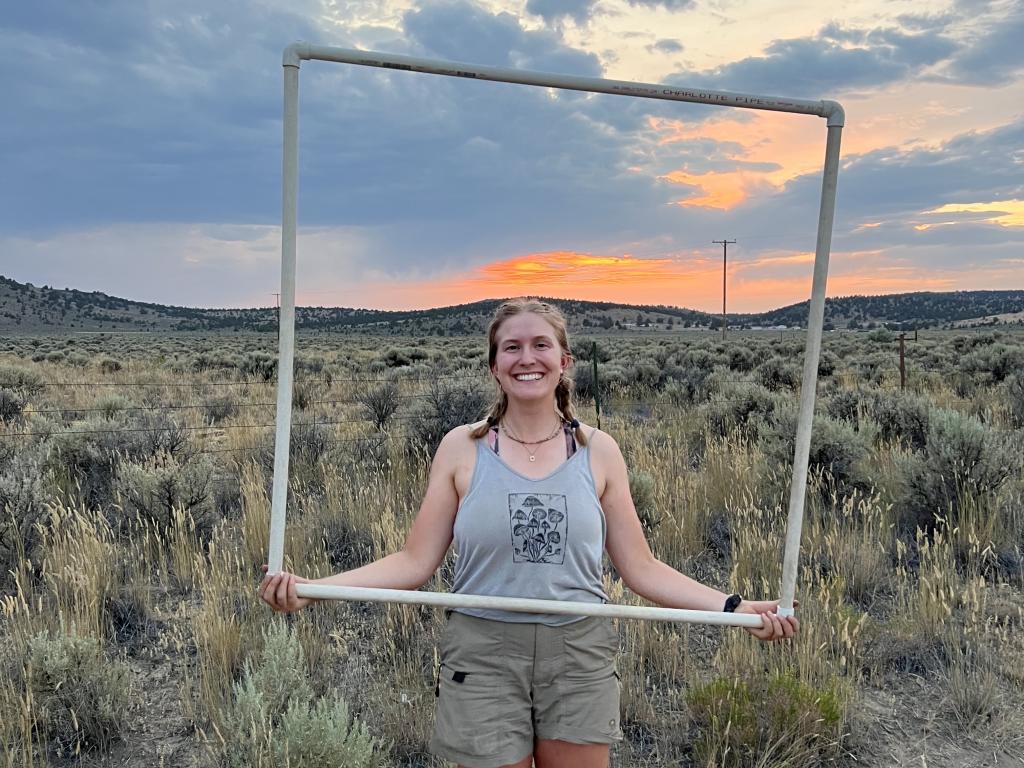
In this Q&A with undergraduate student Zoey Bailey, she shares how she got into the field of fire ecology, needed skills — some unexpected — and the beauty of working outside.
Why are you conducting research and how did you get interested in what you are researching?
My interest in fire ecology sparked in 2021 during a through-hike of the Pacific Crest Trail. Along the 2,653-mile walk, I intimately felt the effects of wildfire on the West Coast and returned to Eugene with a mission to learn everything I could about the ecology of fire and subsequent effects of the disturbance on familiar landscapes.
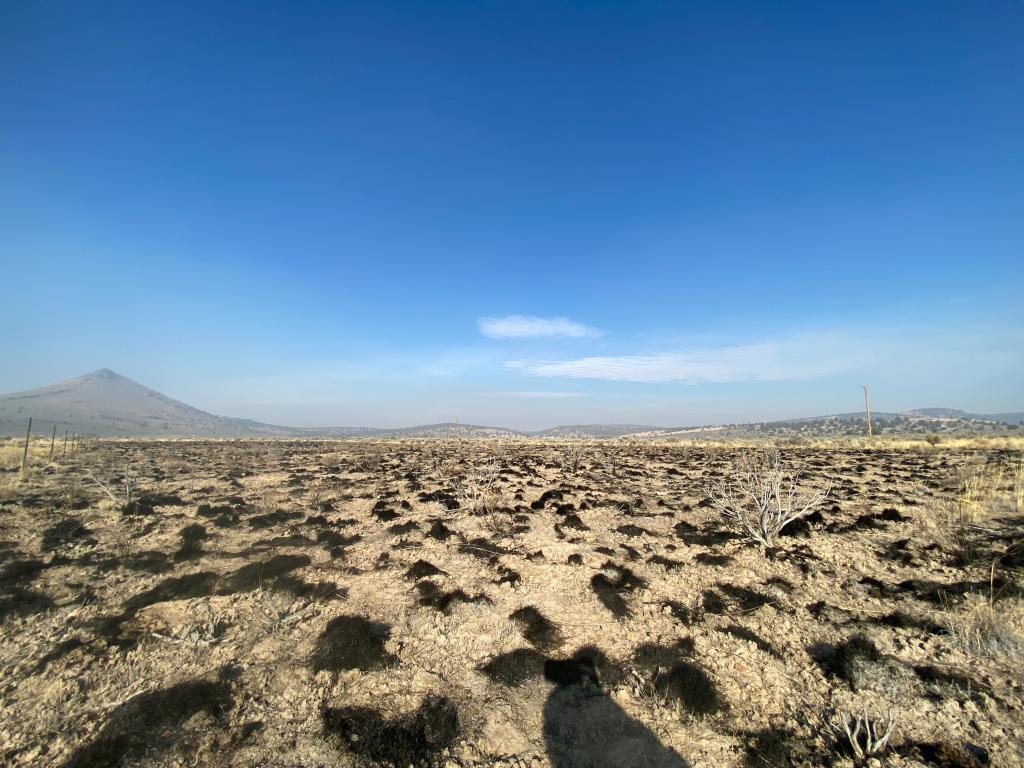
I sought opportunities for involvement in related research on campus and quickly met my incredible research mentor Lina Aoyama, a doctoral student in Environmental Sciences, Studies, and Policy. I began supporting Lina’s Ph.D. work on fire restoration effects on the genetic diversity of seeds in the Great Basin. After a few months I transitioned to my own research project with her mentorship.
Editor’s note: Lauren Hallett, an assistant professor in the Institute for Ecology and Evolution, is the lead faculty within Bailey’s research environment.
Tell us about your project and what responsibilities you have?
Wildfires are occurring more frequently in the shrub steppe ecosystem of the Great Basin (a semi-arid ecosystem that extends into eastern Oregon), due to the aligned effects of a warming climate and the invasion of flammable grasses. The plant community response after fire is determined in part by the germination of the seeds that accumulate beneath the soil surface in a “seed bank.” Germination from the seed bank after a wildfire is a particularly critical ability for native species to compete effectively with invasive species. Loss of native vegetation threatens critical species and reduces forage for cattle. A robust understanding of the ecological succession following fire is therefore a top priority for both local conservationist groups and Oregon ranchers.
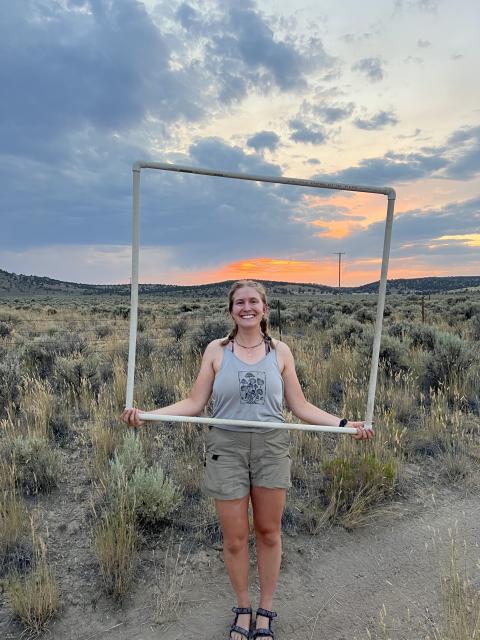
My project contributes to this ecological puzzle by shining light on patterns in the viable seeds in the seed bank as fire frequency changes. Understanding which species can be expected to have viable seeds in the seed bank could inform post-fire restoration efforts on public lands.
In the spring and summer of 2022, I developed my research questions, designed a sampling strategy, and acquired necessary equipment with the financial support of the Center for Undergraduate Research and Engagement and from the University of Oregon Women in Graduate Science.
This funding enabled me to travel to the North Great Basin Experimental Range (45 minutes west of Burns, Oregon) to establish my sampling locations and collect vegetation cover and soil samples before and after a prescribed burn. This work was done over the course of three multi-day trips, two on my own and another with a fellow undergraduate in my lab. I brought the soil collected back to Eugene and spread it in trays in a UO greenhouse to receive water and germinate.
As seedlings emerge, I will identify them to species as a gauge of the species present in the sampling plot. My methodologies are based on other studies in the literature, but like any experimental ecology study, things rarely go to plan, and I’ve been prompted to learn a great deal about troubleshooting! My research will be compiled into a thesis project for the Clark Honors College and presented at the 2023 Undergraduate Research Symposium.
What do you hope to do with what you learn? How has participating in research influenced your career, academic path?
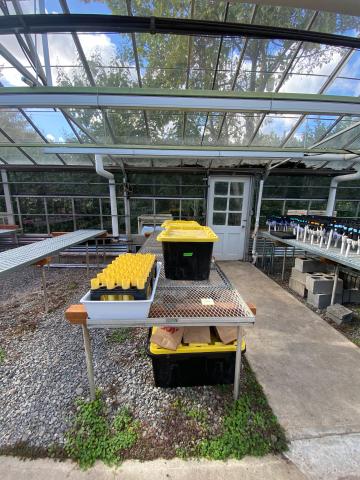
This work confirms my desire to continue exploring fire ecology after completing my undergraduate degree. With a clearer understanding of the workload and lifestyle of a graduate student, I feel more confident searching for the next inspiring lab environment to learn in. I’ve come to recognize the immense value of the lab culture you work within as a source of mentorship, inspiration and moral. I am so lucky to have found the Hallett Lab!
In future research and professional positions, I will undoubtedly apply the tangible skills I’ve picked up through this project such as concise scientific writing, R-Studio, ArcGIS, Trimble GPS, and how to check the tire pressure on an F-250; but I foresee an even greater application for the “soft skills” I’ve learned to cultivate. After this project, I will have a better ability to ask for help, establish systems of accountability, and stand behind my own ideas with confidence in any future position.
What are some favorite aspects about doing research?
The prospect of field work was part of my initial attraction to ecology, so I wasn’t surprised to confirm that spending long hours in my study environment was a highlight of my research experience. I love the challenge of the physical work and the unexpected rewards presented to those there to see them: In my case a Pronghorn antelope ambling through my study site into a settling sun, the nostalgic blend of petrichor and sage wafting after an unusual desert rain, or a sky more full of stars than I knew my eyes could perceive. Working alone in the vastness of the Oregon sagebrush steppe, paying close attention to all my senses whilst lugging a tub of tools and a data sheet, was a thrilling and empowering experience.
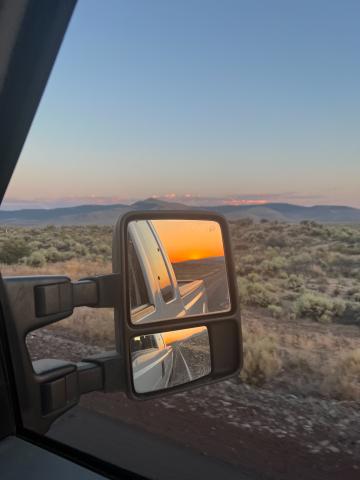
Also, blame the Virgo in me, but I love to organize. Undertaking an independent student research project proved to be the ultimate application of every organizational skill I've ever acquired. I enjoy refining my systems for data management, literature review, project timelines, and take satisfaction in a functional flow.
What is one piece of advice you would give to another student who is looking to conduct research?
Start with a smaller question than you might be comfortable with — don’t worry! By nature, research is expansive. It is difficult to foresee how your work will grow and what opportunities will open along the way. As an undergraduate, I recommend starting with a small question, any question, and let it carry you on the journey. If I’ve learned anything from this project, it’s that the most critical things start as unassuming seeds!
